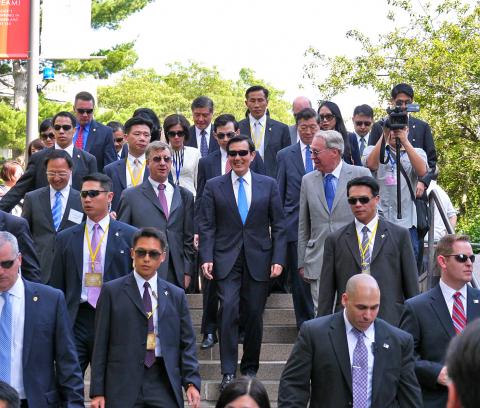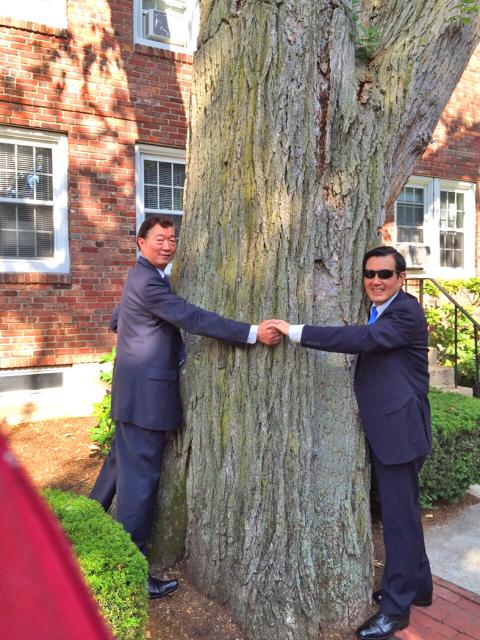President Ma Ying-jeou (馬英九) arrived in Boston on Saturday, en route to the Caribbean and Central America, as part of his 11th overseas visit since assuming office in 2008.
American Institute in Taiwan Chairman Raymond Burghardt and Representative to the US Shen Lyu-shun (沈呂巡) greeted him at the airport.
Ma later visited his alma mater, Harvard University, where he also met with former premier Jiang Yi-huah (江宜樺), who is a visiting scholar at Harvard.

Photo: CNA
Ma, who received his doctorate in juridical science from Harvard Law School in 1981, took a stroll across the campus and revisited the law school complex, libraries, research institutes, dormitory and a big tree, which he said he was obsessed with when he was a student there and has since occasionally dreamed about.
While riding in a vehicle on campus to look for the tree, Ma let out a happy cry when he spotted it and got out to embrace the tree.
From Boston, Ma is scheduled to fly to the Dominican Republic, Haiti and Nicaragua.

Photo: CNA
While in the Dominican Republic, Ma is to deliver a speech to the Dominican Congress and hold talks with Dominican President Danilo Medina, officials said.
In Haiti, Ma and Haitian President Michel Martelly are to jointly open a new Haitian Supreme Court office building. The project was financed by the Taiwanese government and took two years to complete.
While in Nicaragua, Ma is to meet with Nicaraguan President Daniel Ortega and visit Taiwanese businesses in the country. He is also expected to be presented with the key to the city during a visit to the historically important city of Granada.
Ma is scheduled to return home on Saturday after a transit stop in Los Angeles.
Ma last visited Harvard nine years ago when he was mayor of Taipei and chairman of the Chinese Nationalist Party (KMT).
Additional reporting by Wang Yu-chung

EVA Airways today confirmed the death of a flight attendant on Saturday upon their return to Taiwan and said an internal investigation has been launched, as criticism mounted over a social media post accusing the airline of failing to offer sufficient employee protections. According to the post, the flight attendant complained of feeling sick on board a flight, but was unable to take sick leave or access medical care. The crew member allegedly did not receive assistance from the chief purser, who failed to heed their requests for medical attention or call an ambulance once the flight landed, the post said. As sick

A drunk woman was sexually assaulted inside a crowded concourse of Taipei Railway Station on Thursday last week before a foreign tourist notified police, leading to calls for better education on bystander intervention and review of security infrastructure. The man, surnamed Chiu (邱), was taken into custody on charges of sexual assault, taking advantage of the woman’s condition and public indecency. Police discovered that Chiu was a fugitive with prior convictions for vehicle theft. He has been taken into custody and is to complete his unserved six-month sentence, police said. On Thursday last week, Chiu was seen wearing a white

The Taichung District Court yesterday confirmed its final ruling that the marriage between teenage heir Lai (賴) and a man surnamed Hsia (夏) was legally invalid, preventing Hsia from inheriting Lai’s NT$500 million (US$16.37 million) estate. The court confirmed that Hsia chose not to appeal the civil judgement after the court handed down its ruling in June, making the decision final. In the June ruling, the court said that Lai, 18, and Hsia, 26, showed “no mutual admiration before the marriage” and that their interactions were “distant and unfamiliar.” The judge concluded that the couple lacked the “true intention of

EVA Airways, one of the leading international carriers in Taiwan, yesterday said that it was investigating reports that a cabin crew manager had ignored the condition of a sick flight attendant, who died on Saturday. The airline made the statement in response to a post circulating on social media that said that the flight attendant on an outbound flight was feeling sick and notified the cabin crew manager. Although the flight attendant grew increasingly ill on the return flight, the manager did not contact Medlink — a system that connects the aircraft to doctors on the ground for treatment advice during medical